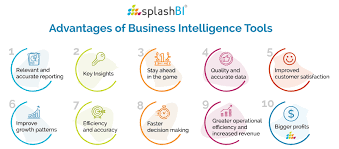Top Business Intelligence Applications in Decision Making
Business Intelligence enables firms to make educated strategic decisions by extracting important facts from a large volume of unstructured data and turning them into useful information.

This valuable data offers important insights that shed light on the underlying trends in consumer behavior, including their preferences and experiences with online purchasing, among other things. This increases operational effectiveness and business productivity.
Every day, contact centers handle tens of thousands of consumer contacts, many of which contain almost untapped critical insights that may be effectively used to deliver enormous value to businesses. With the exception of evaluations for Quality Assurance, this information is still widely underutilized.
Businesses that use Business Intelligence have access to vast data resources that can assist them in making timely, strategic decisions that will help them meet their goals and objectives.
Business intelligence gathering teams can thoroughly analyze customer interactions in the form of voice calls, chat conversations, emails, etc. to shed light on aspects such as customer preferences, likes, and dislikes, technical difficulties faced by customers, customer reactions to promotions, and the online shopping customer experience on a website. This analysis has many benefits, including raising conversion rates.
Advantages Of Business Intelligence Applications For Decision Making

The new IT application class, “Business Intelligence,” uses information resources to support better decision-making. Data mining, predictive analytics, and data visualization are just a few tools and methods used to deliver insightful information about past, present, and future company indicators.
Applications for business intelligence (BI) play a crucial role in attaining operational effectiveness, coordinated planning, and monitoring.
The following are some of the advantages of applications of BI technology in critical business decision-making:
Boost Corporate Productivity
Businesses do not need to shift resources to collect Business Intelligence, so they may channel their vital resources and personnel to increase business productivity (BI). All BI collection work is handled by the BI team, which reduces costs, frees up time, and produces excellent reporting that promotes increased business efficiency.
The BI collection team can gather important information from client interactions and provide it in a way that is simple to comprehend, convey, and use. BI collection teams ensure that comprehensive reports are sent to businesses, guaranteeing that all important data is presented in a well-documented and appealing manner, allowing the data to be used to run the business effectively.
Get Valuable Business Insights
Businesses can evaluate department-specific performance, staff productivity, revenue, and overall success. Since BI technologies help firms identify what’s working and what isn’t, they can reveal strengths and problems. Setting up alerts is simple, and it may assist busy executives to remain on top of the KPIs that are most important to their company while tracking these measures.
Good Return On Investment (ROI)
Businesses gain from BI because it allows them to significantly reduce expenses, enhance revenue, increase margins, encourage cost avoidance, and do much more.
Additionally, BI offers qualitative ROI in the form of improved employee productivity, customer satisfaction, business and process efficiency, and much more. Companies can reduce operating costs by increasing operational effectiveness and streamlining corporate procedures.
Competitive Analysis
The capacity to handle and work with a lot of data is itself a competitive advantage. Additionally, using BI software makes it simple to undertake budgeting, planning, and forecasting, which goes far beyond normal analysis and is a very practical approach to keeping one step ahead of the competition. Businesses can also monitor their rivals’ sales and marketing results to develop their product and service differentiation strategies.
Improved Sales Decisions
Using industry-specific BI, businesses may identify accurate sales trends based on their customers’ preferences, responses to offers, online shopping experiences, purchasing behaviors, and patterns and trends that affect sales. An organization can decide the best course of action to keep key customers and recover from missed sales opportunities by leveraging consumer purchase patterns.
By delving deeper into such comprehensive insights, a company can quickly determine which link-sell prospects to improve or which products are suited for cross-selling. A business can develop the best approach for repositioning the product before it stops buying by recognizing decreasing customers.
More Informed Decision Making
Businesses can monitor the efficiency of their procedures by reporting on timely and precise data. Business intelligence provides crucial information about the company’s present and historical performance, future trends, anticipated demands, customer behavior, and other factors to help businesses make informed strategic decisions.
In order for the company to successfully use the information at hand to better operate the business, BI teams make sure that it receives real-time enhanced reports.





















